| Listing 1 - 10 of 10 |
Sort by
|
Book
ISBN: 3598710178 3111812235 3110953854 Year: 2012 Publisher: Berlin ; Boston : De Gruyter,
Abstract | Keywords | Export | Availability | Bookmark
 Loading...
Loading...Choose an application
- Reference Manager
- EndNote
- RefWorks (Direct export to RefWorks)
HISTORY / Ancient / General. --- Orestes, --- Orest, --- Orestas, --- Oreste, --- Oresti, --- Oresto, --- Oresztész, --- オレステース, --- אורסטס --- 오레스테스, --- اورستس --- Орест, --- Ὀρέστης,
Book
ISBN: 3825378195 9783825378196 3825369110 9783825369118 Year: 2018 Publisher: Heidelberg, Germany : Universitatsverlag Winter,
Abstract | Keywords | Export | Availability | Bookmark
 Loading...
Loading...Choose an application
- Reference Manager
- EndNote
- RefWorks (Direct export to RefWorks)
"The book examines the literary representation of the myth of Orestes in ancient Greek tragedy and in modern French literature"--Cover page 4.
Orestes, --- Orest, --- Orestas, --- Oreste, --- Oresti, --- Oresto, --- Oresztész, --- オレステース, --- אורסטס --- 오레스테스, --- اورستس --- Орест, --- Ὀρέστης, --- In literature.
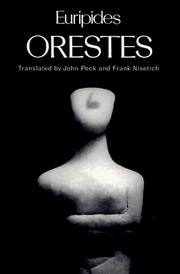
ISBN: 1280528060 0198025653 1429406127 9781429406123 9786610528066 6610528063 0195096592 9780195096590 0197704875 Year: 1995 Publisher: New York : Oxford University Press,
Abstract | Keywords | Export | Availability | Bookmark
 Loading...
Loading...Choose an application
- Reference Manager
- EndNote
- RefWorks (Direct export to RefWorks)
This is a translation of Euripides's 'Orestes' by Peck, a poet, and Nisetich, a classicist, with introduction, glossary, and full stage directions.
Mythology, Greek. --- Greek mythology --- Orestes, --- Orest, --- Orestas, --- Oreste, --- Oresti, --- Oresto, --- Oresztész, --- オレステース, --- אורסטס --- 오레스테스, --- اورستس --- Орест, --- Ὀρέστης, --- Orestes (Greek mythology) --- Mythology, Greek --- Drama.
Book
ISBN: 128205628X 9786612056284 1442670673 9781442670679 9780802067470 0802067476 9781282056282 Year: 1989 Publisher: Toronto
Abstract | Keywords | Export | Availability | Bookmark
 Loading...
Loading...Choose an application
- Reference Manager
- EndNote
- RefWorks (Direct export to RefWorks)
The major part of Conacher's work is a detailed running commentary on, and dramatic analysis of, the three plays. It is supplemented in notes and appendixes by discussions of the philological problems relevant to the interpretation, and by a sampling of other scholaraly views on a number of controversial points.
Tragedy. --- Drama --- Aeschylus. --- Orestes, --- Orest, --- Orestas, --- Oreste, --- Oresti, --- Oresto, --- Oresztész, --- オレステース, --- אורסטס --- 오레스테스, --- اورستس --- Орест, --- Ὀρέστης, --- Aeschylus --- In literature. --- Oresteia (Aeschylus)
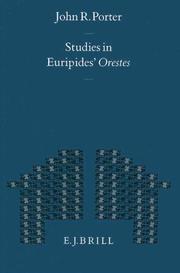
ISBN: 9004096620 9004329242 9789004096622 9789004329249 Year: 1994 Volume: 128 Publisher: Leiden Brill
Abstract | Keywords | Export | Availability | Bookmark
 Loading...
Loading...Choose an application
- Reference Manager
- EndNote
- RefWorks (Direct export to RefWorks)
This work challenges recent critical assessments that emphasize the allegedly subversive elements in Euripides' play. The Orestes is found to present a curious mélange of early and late Euripidean features, resulting in a drama where the tragic potential of Orestes' predicament becomes lost amid the moral, political and situational chaos that dominates the late Euripidean stage. Throughout, emphasis is placed on reading the Orestes in light of Greek stage conventions and the poet's own practice. Of particular interest are: an original examination, in light of Greek rhetorical practice, of Orestes' agon with Tyndareus; an analysis of the Phrygian's monody as a cunning hybrid of Timothean nome and traditional messenger speech; and a re-evaluation of the play's troubling deus ex machina.
Euripides --- Orestes (Greek mythology) --- Greek drama --- Oreste (Mythologie grecque) --- Théâtre grec --- Drama --- History and criticism --- Théâtre --- Histoire et critique --- Euripides. --- Orestes (Greek mythology) in literature. --- Orestes (Greek mythology) in literature --- Euripide --- Théâtre grec --- Théâtre --- Orestes, --- Literature. --- Belles-lettres --- Western literature (Western countries) --- World literature --- Authors --- Authorship --- Orest, --- Orestas, --- Oreste, --- Oresti, --- Oresto, --- Oresztész, --- Orestes (Euripides) --- Euripidis Orestes (Euripides) --- Philology
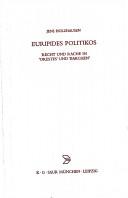
ISBN: 359877737X 3110930137 Year: 2003 Publisher: München Saur
Abstract | Keywords | Export | Availability | Bookmark
 Loading...
Loading...Choose an application
- Reference Manager
- EndNote
- RefWorks (Direct export to RefWorks)
Das Buch enthält eine vergleichende Interpretation der beiden Tragödien, die Euripides am Ende seines Lebens (gest. 406 v. Chr.) verfasst hat. Es wird versucht, die Parallelen beider Werke in Handlungsablauf, dramaturgischem Konzept und Aussageabsicht aufzuzeigen. Dies ermöglicht es, das umstrittene Problem zu lösen, mit welchen Intentionen der Dichter die zumeist als "rätselhaft" empfundenen 'Bakchen' verfasste. Aufgrund des Vergleiches erweist sich das Stück als ein politisches Dokument, das die unauflösliche Problematik einer Ethik, die auf Rache und Vergeltung beruht, zeigt und die Grenzen deutlich macht, die dem Theater als gesellschaftlicher Institution gesetzt sind.
Bacchantes in literature. --- Political plays, Greek --- Bacchantes in literature --- Orestes (Greek mythology) in literature --- Politics and literature --- History and criticism --- Euripices --- Euripides. --- Political and social views. --- Orestes (Greek mythology) in literature. --- History and criticism. --- Euripides --- Orestes, --- In literature. --- Orest, --- Orestas, --- Oreste, --- Oresti, --- Oresto, --- Oresztész, --- オレステース, --- אורסטס --- 오레스테스, --- اورستس --- Орест, --- Ὀρέστης,
Book
ISBN: 9780674996274 0674996275 9780674996281 9780674996298 0674996283 0674996291 Year: 2008 Volume: 145, 146, 505 Publisher: Cambridge (Mass.) : Harvard university press,
Abstract | Keywords | Export | Availability | Bookmark
 Loading...
Loading...Choose an application
- Reference Manager
- EndNote
- RefWorks (Direct export to RefWorks)
Aeschylus --- Aischylos --- Eschilo --- Eschyle --- Eschylus --- Mythology, Greek --- Greek drama (Tragedy) --- Mythologie grecque --- Tragédie grecque --- Drama --- Translations into English --- Théâtre --- Traductions anglaises --- Greek drama --- Languages & Literatures --- Greek & Latin Languages & Literatures --- Orestes (Greek mythology) --- Orestes, --- Eskhil --- Esquilo --- Aiskhilos --- Eshil --- Æskílos --- Ajschylos --- Eschil --- Esḳilos --- Äschylos --- Eskili --- Aiszkhülosz --- Eschylos --- Iskilos --- Эсхил --- אייסכילוס --- איסכילאס --- איסכילוס --- إيسخولوس --- ايسخيلوس --- Αἰσχύλος --- Orest, --- Orestas, --- Oreste, --- Oresti, --- Oresto, --- Oresztész, --- オレステース, --- אורסטס --- 오레스테스, --- اورستس --- Орест, --- Ὀρέστης, --- Aeschylus - Translations into English
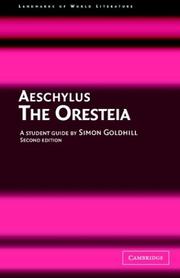
ISBN: 1107148790 9786612394652 1282394657 051164423X 0511800266 0511166079 0511164122 0511566743 0511164920 9780511164125 9780511164927 0511162529 9780511162527 9780521832298 0521832292 9780521539814 0521539811 9780511166075 9780511800269 9780511644238 0521832292 0521539811 9781107148796 661239465X 9781282394650 9780511566745 Year: 2004 Publisher: Cambridge Cambridge University Press
Abstract | Keywords | Export | Availability | Bookmark
 Loading...
Loading...Choose an application
- Reference Manager
- EndNote
- RefWorks (Direct export to RefWorks)
This is the only general introduction in English to Aeschylus' Oresteia, one of the most important and most influential of all Greek dramas. It discusses the Greek drama festival and the social and political background of Greek tragedy, and offers a reading of this central trilogy. Simon Goldhill focuses on the play's themes of justice, sexual politics, violence, and the position of man within culture, and explores how Aeschylus constructs a myth for the city in which he lived. A final chapter considers the influence of the Oresteia on later theatre. Its clear structure and guide to further reading will make this an invaluable guide for students and teachers alike.
Greek drama (Tragedy) --- Tragedy. --- Drama --- History and criticism. --- Aeschylus. --- Orestes, --- Agamemnon, --- Electra --- Électre --- Alektra --- Ēlektra --- Elektro --- Elettra --- 厄勒克特拉 --- エーレクトラー --- אלקטרה --- 엘렉트라 --- Електра --- Электра --- الکترا --- اليكترا --- Ἀλέκτρα --- Ἠλέκτρα --- Agaiméamnón, --- Agamemno, --- Agamemnonas, --- Agamemnoni, --- Agamennone, --- Agamemnons, --- Agamenón, --- Agememnon, --- Ἀγαμέμνων, --- Αγαμέμνονας, --- أجاممنون --- آگاممنون --- Агамемнан, --- Агамемнон, --- 아가멤논, --- אגממנון --- アガメムノーン, --- 阿伽门农, --- Orest, --- Orestas, --- Oreste, --- Oresti, --- Oresto, --- Oresztész, --- オレステース, --- אורסטס --- 오레스테스, --- اورستس --- Орест, --- Ὀρέστης, --- Aeschylus --- In literature. --- Orestes (Greek mythology) in literature. --- Agamemnon (Greek mythology) in literature. --- Electra (Greek mythology) in literature. --- Arts and Humanities --- History
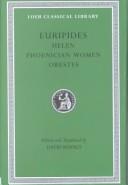
ISBN: 0674996003 9780674996007 Year: 2002 Volume: 5 11 Publisher: Cambridge : Harvard University Press,
Abstract | Keywords | Export | Availability | Bookmark
 Loading...
Loading...Choose an application
- Reference Manager
- EndNote
- RefWorks (Direct export to RefWorks)
Euripides (c. 485-406 BCE) has been prized in every age for his emotional and intellectual drama. Eighteen of his ninety or so plays survive complete, including Medea, Hippolytus, and Bacchae, one of the great masterpieces of the tragic genre. Fragments of his lost plays also survive.
Helen of Troy (Greek mythology) --- Seven against Thebes (Greek mythology) --- Orestes (Greek mythology) --- Seven against Thebes --- Thebes, Seven against (Greek mythology) --- Mythology, Greek --- Euripides --- Greek drama (Satyr play) --- Greek drama (Tragedy) --- Greek drama --- Mythology, Greek, in literature --- Tragedy --- Greek mythology --- Satyric drama, Greek --- Ėvripid --- Yūrībīdīs --- Euripide --- Euripedes --- Eŭripido --- Eurypides --- Euripidesu --- אוריפידס --- エウリーピデース --- Εὐριπίδης --- Helen, --- Orestes, --- Orest, --- Orestas, --- Oreste, --- Oresti, --- Oresto, --- Oresztész, --- オレステース, --- אורסטס --- 오레스테스, --- اورستس --- Орест, --- Ὀρέστης, --- Elena, --- Helena, --- Helenē, --- Yelena, --- 海伦 , --- ヘレネー, --- הלנה, --- העלענע, --- 헬레네, --- Хелена, --- Єлена, --- Елена , --- هلن, --- هيلين, --- Ἑλένη, --- Drama --- Greek literature --- Dionysia --- Helen of Troy (Greek mythology) - Drama --- Seven against Thebes (Greek mythology) - Drama --- Orestes (Greek mythology) - Drama
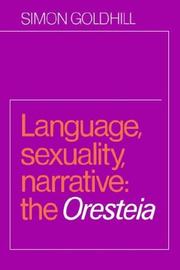
ISBN: 0521265355 0521604303 9780521604307 9780521265355 9780511552496 0511552491 Year: 2004 Publisher: Cambridge : University Press,
Abstract | Keywords | Export | Availability | Bookmark
 Loading...
Loading...Choose an application
- Reference Manager
- EndNote
- RefWorks (Direct export to RefWorks)
This book is concerned with the complexity and difficulty of reading the Oresteia. It is not a traditional commentary, although it is often concerned with problems of interpretation and language, nor is it simply what is generally understood by a literary study, although it often discusses the wider themes of the narrative. It is a close reading of the text concentrating on the developing meanings of words within the structuring of the play. In particular, Simon Goldhill focuses on the text's interests in language and its control, in sexuality and sexual difference, and in the progression and description of events. Dr Goldhill links a sound philological knowledge with material drawn widely from modern literary theory and anthropological studies. The result is a challenging and provocative book, which offers for the serious student of Greek drama an exciting range of insights into one of the most important texts of the ancient world.
Greek language --- Narration (Rhetoric) --- Orestes (Greek mythology) in literature --- Rhetoric, Ancient --- Sex in literature --- Tragedy --- Drama --- Ancient rhetoric --- Classical languages --- Greek rhetoric --- Latin language --- Latin rhetoric --- Semantics --- History --- Rhetoric --- Aeschylus. --- Rhetoric, Ancient. --- Aeschylus --- Orestes, --- In literature --- Orestes (Greek mythology) in literature. --- Sex in literature. --- Tragedy. --- Semantics. --- Agamemnon (Greek mythology) --- Erinyes (Greek mythology) --- Criticism and interpretation. --- Agamemnon, --- Arts and Humanities --- Discourse analysis, Narrative --- Narratees (Rhetoric) --- Orest, --- Orestas, --- Oreste, --- Oresti, --- Oresto, --- Oresztész, --- オレステース, --- אורסטס --- 오레스테스, --- اورستس --- Орест, --- Ὀρέστης, --- In literature. --- Narration (Rhetoric) - History - To 1500 --- Greek language - Semantics --- Aeschylus - Oresteia --- Orestes, - King of Argos (Mythological character) - In literature --- Eschyle (0525?-0456 av. J.-C.) --- Eschyle (0525?-0456 av. J.-C.). Orestie --- Langage et langues --- Langue --- Différences entre sexes --- Antiquité --- Orestes, - King of Argos (Mythological character) --- Langues --- Différences entre sexes --- Antiquité
| Listing 1 - 10 of 10 |
Sort by
|

 Search
Search Feedback
Feedback About UniCat
About UniCat  Help
Help News
News